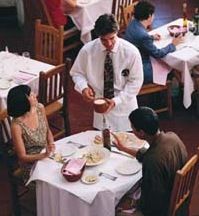The company's annual 4th of July barbecue started out a huge success. The ribs were superb. The potato salad was excellent. Even Helen's famous coleslaw got rave reviews. But about the time the sun went down, people started sprinting in all directions, and they weren't running in the three-legged race. Most of them were headed for the nearest bathroom. Food poisoning claims another round of victims.
The Centers for Disease Control and Prevention estimates that there will be about 76 million cases of food poisoning this year. It's an estimate because most cases of food poisoning go unreported, chalked up to the stomach flu or another bug. Even though the United States has strict guidelines when it comes to processing and handling food, there is always a risk of some food becoming contaminated. Ironically, though many cases of food poisoning do happen in restaurants, the most common place for foodborne illnesses to strike is your kitchen.
Advertisement
How Spoiled Food Makes You Feel
The symptoms you have after eating a pork chop laden with bad bacteria can range from mild (a few stomach cramps) to severe (you spend a couple of days camped out on the bathroom floor). Many people describe food poisoning as akin to being hit by a very large truck. The most common symptoms are diarrhea, stomach pain, cramping, nausea, and vomiting.
Because most of the symptoms of food poisoning are similar to those of other illnesses, such as a stomach virus, people aren't always sure food is the problem. If you think you've got food poisoning but aren't sure, take note: Most people get sick about 4 to 48 hours after eating the suspect food. And if you got sick, chances are everyone else who ate a contaminated chop will be sick, too.
Foiling Food Poisoning
Of course, prevention is always the best medicine, and the smartest way to treat food poisoning is to avoid getting it in the first place. Although you can't control the conditions in the restaurants you patronize, you can take several precautions at home by following these tips:
- Keep mixed foods, such as salads with mayonnaise dressing and foods that contain dairy products, refrigerated.
- Thaw meat in the refrigerator, not at room temperature.
- Stuff turkeys or roasts just before cooking -- or cook the stuffing separately.
- Keep perishable foods cold.
- Cook chicken, pork, and beef very thoroughly.
- Wash hands, utensils, and surfaces with very hot water and soap after handling meat or eggs.
To learn more about battling stomach ailments, visit these links:
- To see all of our home remedies and the conditions they treat, go to our main Home Remedies page.
- In Home Remedies for Upset Stomach, find cures in your kitchen for your tummy troubles.
- Quench the flames and find relief from the burn in Home Remedies for Heartburn.
- If you're queasy, read Home Remedies for Nausea to learn about common cures that will help you feel better.
This information is solely for informational purposes. IT IS NOT INTENDED TO PROVIDE MEDICAL ADVICE. Neither the Editors of Consumer Guide (R), Publications International, Ltd., the author nor publisher take responsibility for any possible consequences from any treatment, procedure, exercise, dietary modification, action or application of medication which results from reading or following the information contained in this information. The publication of this information does not constitute the practice of medicine, and this information does not replace the advice of your physician or other health care provider. Before undertaking any course of treatment, the reader must seek the advice of their physician or other health care provider.
Advertisement


